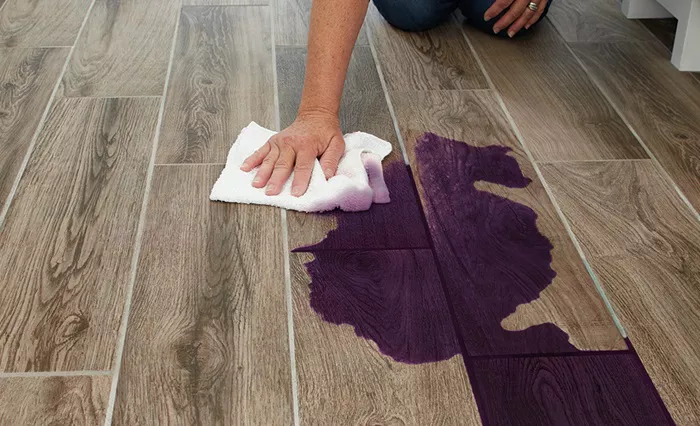Ceramic tile floors are a popular choice for their durability, aesthetic appeal, and ease of maintenance. However, to keep them looking their best and ensure their longevity, it’s important to use the right cleaning solutions. Selecting an effective cleaner can prevent grime buildup, maintain the tile’s shine, and protect the grout. This guide explores the best cleaning solutions for ceramic tile floors, highlighting various options and tips to achieve optimal results.
1. Understanding Ceramic Tile Floors
Characteristics of Ceramic Tile
Ceramic tiles are made from clay and other natural materials, fired at high temperatures to create a hard, durable surface. They come in various finishes, including glazed and unglazed, each requiring different cleaning approaches. Glazed tiles have a protective coating that makes them resistant to stains and easier to clean, while unglazed tiles are more porous and may require additional care.
Why Cleaning Matters
Regular cleaning helps maintain the tile’s appearance and functionality. Dirt and grime can scratch the surface, dulling its finish over time. Additionally, proper cleaning prevents grout from becoming discolored and prevents mold and mildew growth, especially in areas with high moisture, such as bathrooms and kitchens.
2. Types of Cleaning Solutions
Commercial Tile Cleaners
Commercial cleaners are specially formulated for ceramic tiles, offering convenience and effectiveness. They are available in various forms, including liquids, sprays, and concentrates. When choosing a commercial cleaner, look for products that are pH-balanced and designed specifically for ceramic tiles. Some popular options include:
Bona Stone, Tile & Laminate Floor Cleaner: This non-toxic, pH-balanced cleaner is effective for cleaning ceramic tiles without leaving residue.
Zep Neutral pH Floor Cleaner: Known for its gentle formula, it’s suitable for ceramic tiles and helps maintain the floor’s finish.
Homemade Cleaning Solutions
For those who prefer DIY solutions, several homemade options can effectively clean ceramic tile floors. These solutions are often made from common household ingredients and can be cost-effective alternatives to commercial products. Popular homemade solutions include:
Vinegar and Water: Mix one cup of white vinegar with a gallon of warm water. Vinegar’s acidic nature helps dissolve grime and disinfects the tiles. However, avoid using vinegar on unsealed grout or natural stone tiles, as it may damage the surface.
Baking Soda and Water: Create a paste by mixing baking soda with water. Apply it to stains and grout lines, then scrub gently. Baking soda’s mild abrasiveness helps lift stains without scratching the tile.
Enzyme Cleaners
Enzyme-based cleaners are excellent for breaking down organic stains, such as those from food or pet accidents. They use natural enzymes to digest and remove stains and odors. These cleaners are especially useful for areas where spills and stains are common. Brands like Biokleen and Nature’s Miracle offer enzyme-based cleaners that are effective yet gentle on ceramic tiles.
See also: How To Clean Battery Acid: A Comprehensive Guide
3. Application Techniques
Mopping
For routine cleaning, mopping with a suitable cleaning solution is often the easiest method. Follow these steps:
Prepare the Solution: Dilute your chosen cleaner according to the manufacturer’s instructions or use a homemade solution.
Mop the Floor: Use a clean mop or microfiber cloth to apply the solution to the tile. Ensure the mop is not too wet to avoid excess water, which can seep into grout lines and cause damage.
Rinse and Dry: After mopping, rinse the floor with clean water to remove any cleaner residue. Dry the tiles with a clean, dry mop or towel to prevent water spots and streaks.
Spot Cleaning
For localized stains or spills, spot cleaning is often more effective. Apply your chosen cleaner directly to the affected area, allow it to sit for a few minutes, then scrub with a soft brush or cloth. Rinse and dry the area thoroughly to prevent residue buildup.
Grout Cleaning
Grout can be more challenging to clean due to its porous nature. Use a grout-specific cleaner or a homemade baking soda paste to tackle grout lines. Apply the cleaner, let it sit, then scrub with a grout brush or an old toothbrush. Rinse thoroughly and dry to prevent discoloration and mildew growth.
See also: How To Paint Your Garage Floor: A Comprehensive Guide
4. Maintenance Tips
Regular Cleaning Schedule
Establish a regular cleaning schedule to keep your ceramic tiles in top condition. Sweep or vacuum the floor daily to remove loose dirt and debris, and mop weekly with a suitable cleaner. Address spills and stains promptly to prevent damage.
Avoid Harsh Chemicals
Avoid using harsh chemicals or abrasive cleaners, as these can damage the tile’s surface and grout. Steer clear of bleach or ammonia-based products unless specifically recommended for your tile type.
Use Mats and Rugs
Place mats or rugs at entry points to reduce the amount of dirt and moisture tracked onto your tiles. These preventative measures help minimize wear and tear on your floors.
Conclusion
Choosing the best cleaning solution for ceramic tile floors depends on your specific needs and preferences. Commercial cleaners offer convenience and effectiveness, while homemade solutions provide cost-effective alternatives. Enzyme cleaners are ideal for organic stains, and proper application techniques ensure optimal results. By following these guidelines and maintaining a regular cleaning routine, you can keep your ceramic tile floors looking pristine and extend their lifespan, ensuring they continue to enhance your home’s beauty and functionality.
Related Topics:
-
How To Read A Tape Measure In Millimeters (Mm): A Detailed Guide
-
How To Wire A Light Switch With 2 Wires: A Comprehensive Guide

